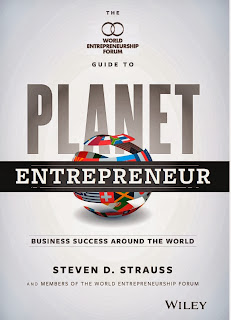NEXT BOOKS: Planet Entrepreneur AND Unlimited Sales Success
Wednesday, December 4, 2013
Two books to read and review this time! If you're interested, click the link to sign up on the upper left of this page.
First up is Planet Entrepreneur: The World Entrepreneurship Forum's Guide to Business Success Around the World by Steven D. Strauss, USA Today’s small business columnist and more.
Here’s what he says about the book: “I wrote it with several co-authors from the World Entrepreneurship Forum. I am more excited about this book than almost any other I have written in a while, for a few reasons:
First, I think (hope!) it is very interesting. It looks at the explosive growth of entrepreneurship around the globe ('regular' entrepreneurs, social entrepreneurs, green entrepreneurs, etc.), and how they are changing the world, right now, radically, and for the better.
Second, at a time when the world is so divided, it is nice to share a book that is positive, hopeful, and looks at ways and ideas that link us together.
We are living in a world of incredible challenge and changes, and for both the entrepreneur and potential entrepreneur alike, this also means it is a world of ample opportunities. From the fall of the Berlin Wall to the rise of e-commerce and social media, there are now, today, more markets, tools, and opportunities for entrepreneurs than ever before. Even better: we are now also living in a world more predisposed to entrepreneurial solutions than ever, and we need those solutions—not just to create the Next Big Thing, but to solve the Next Big Problem. Every issue that individuals, communities, and nations face offers the entrepreneur the chance to make a difference. For anyone ready to embark on a mission to solve problems, create communities, build businesses, tap technology, and think entrepreneurially, this new world is teeming with opportunities for success.”
You can read an excerpt and find out more about the book here.
Next is Unlimited Sales Success by Brian Tracy. Tracy is a longtime sales trainer and guru, and this is a very solid primer on sales basics and more.
Here’s a brief description:
“If there were a single great "secret" to being an elite sales professional, surely one of the millions of attendees of Brian Tracy's sales seminars would have spilled the beans by now. There isn't a secret. But there is a set of consistently successful selling techniques that most companies don't teach their salespeople, and which most entrepreneurs and independent sales pros think they don't have time to learn. Based on more than 40 years of selling experience - in virtually all product categories and market conditions, Unlimited Sales Success shows that these proven sales skills are learnable - by anyone. Highlighting practical, time-tested principles including: the psychology of selling: your own mindset is just as important as your customer's; personal sales planning and time management: whether you work for yourself or someone else, great planning equals great success; prospecting power: get more and better appointments; consultative and relationship selling: position yourself as a partner with the account; identifying needs accurately: you'll know how to arouse their interest and overcome objections; influencing customer behavior: learn what triggers quick buying decisions; closing the sale: the five best methods ever discovered; and more. Unlimited Sales Success is loaded with eye-opening facts and exercises, peppered with stories of great selling techniques in action, and organized into a use-it-now approach that will help you become a top sales professional-starting today.”
You can read more about it here.
You can review both books or choose one. The deadline will be generous, so no worries. Read more...




